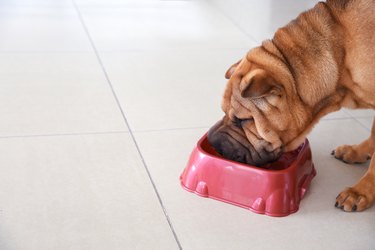
Nip, nibble, bite, chew, however you phrase it, mouthing is normal canine behavior. There are a variety of reasons your puppy or adult dog is using his front teeth to nibble or chew on things. Your job as his parent is to teach your dog what's acceptable to nibble on and what is off limits.
Dog nibbling starts young
Video of the Day
A dog nibbling and nipping is instinctual puppy behavior, according to the American Society for the Prevention of Cruelty to Animals. As puppies grow up, they toss, tumble, and play together, which includes playful nips and bites. At a young age, while still living with mom and litter mates, most puppies learn to control their biting.
Video of the Day
Every so often a pup will bite a little too hard with his razor-sharp teeth, causing his sibling to admonish him with a sharp yelp. After enough encounters like this, a puppy learns how to play-bite without hurting his pals, meaning the play session can go on uninterrupted. If your dog is nipping, he could be engaging in a bit of affectionate play, hearkening back to his days with his mom and litter mates.
Mouthing toys and other objects
Perhaps your dog doesn't like to be left alone and the stress of being left behind causes him to nibble. Sometimes a dog with separation anxiety will chew, lick, or suck on things to help him relieve the stress of the situation. A toy, favorite blanket, or even one of your shoes may be be the object that soothes his anxiety.
Teething is another reason for dog nibbling behavior. If your dog is still a pup and in the teething stages, he's probably chewing on just about anything that will provide him relief from the pain of teething.
Dog nips dog
Separation anxiety also may cause your dog to nibble on himself, as he seeks to self-soothe. Allergies, boredom, dry skin, pain, hormonal imbalances, and parasites also are potential causes of compulsive self-chewing or nibbling behavior.
Left unchecked, your dog could develop a hot spot, an irritated, wet, red area that can become painful and large quickly. If your dog spends a lot of time nibbling on one spot, he should see a vet.
Teaching playful behavior
If you're concerned about your dog's nibbling behavior, pay attention to the context to determine why it's happening and if it's problem behavior. If he's nipping at you or anyone else, he needs to learn right away it's not acceptable.
The ASPCA recommends taking a page from his first family by letting him mouth on your hand until he bites hard. When he does, respond with a high yelp and allow your hand to go limp. Praise him for stopping and resume the routine up to two more times in a 15-minute period.
If your high-pitched squeal doesn't do the trick, admonish him with a stern "too bad" or a time-out routine, where 10- to 20-second breaks of ignoring him replace your yelps. Your ultimate goal is to reach a point where you only feel pressure from his mouth when you play.
Chew on this
If your dog nibbling behavior includes objects that aren't appropriate for chewing, admonish him with a stern "uh oh," and replace the off-limits item with something he can chew, advises Dog Problems Solved. Spraying chewing deterrents, such as a bitter spray, will help him learn what he can and can't chew on. Offering him old shoes or other household items will confuse him about what he can and can't chew on, so stick to chew toys for consistency.